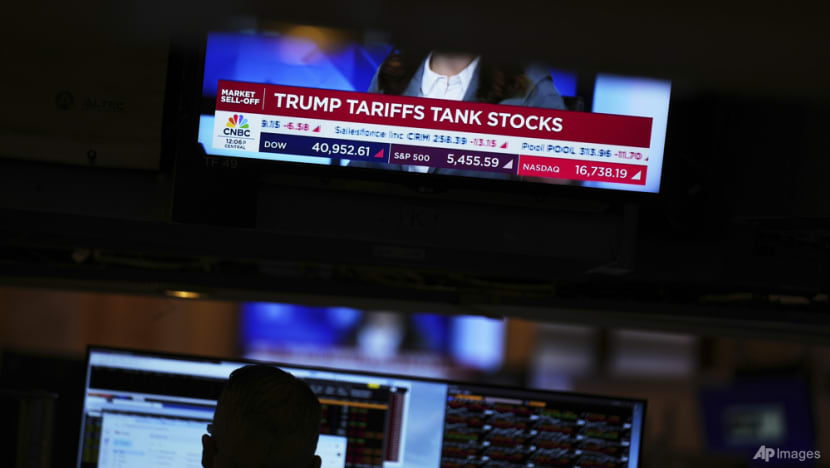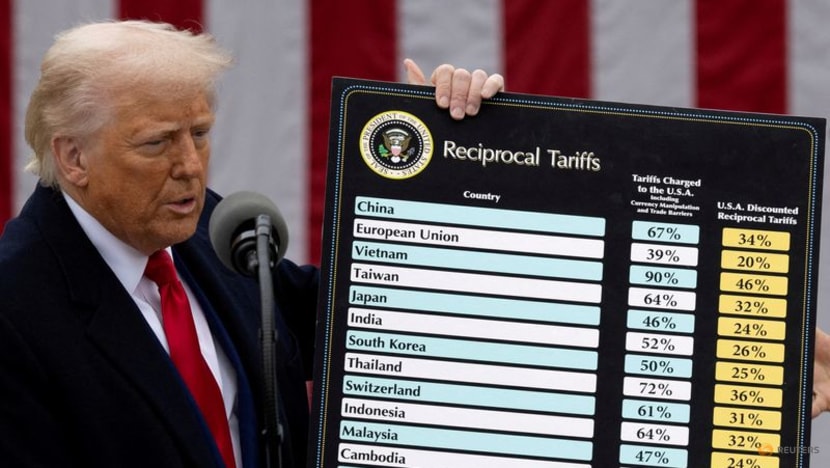Commentary: Tariffs are a test of this crisis leadership skill
Navigating upheaval requires accepting that everything you believe may be wrong. Not all leaders have it, says Gautam Mukunda for Bloomberg Opinion.

BOSTON, Massachusetts: United States President Donald Trump’s announcement, abeyance and (in the case of China) escalation of tariffs has thrown markets into turmoil, creating levels of uncertainty approaching those produced by COVID-19 and even threatening the bond market. Yet in the days since the administration declared a 90-day pause on many of the duties, markets appear to have stabilised.
This surface calm risks luring leaders into perhaps the biggest mistake one can make when navigating a crisis: failing to update your mental models to properly account for the new world you’re now living in.
Crises are where reputations and fortunes are made and destroyed. For example, JPMorgan CEO Jamie Dimon and Ford CEO Alan Mulally became icons because of their performance during the global financial crisis of 2008.
It’s a moment when the stakes are higher, the time frames are shorter, and even the best leaders don’t know everything they need to know. All too often, they don’t even know what questions they should be asking.
A crisis is often triggered by some formerly unquestioned assumption abruptly breaking down. The 2008 financial crisis for example, sprang from the belief that the US would never suffer a nationwide decline in housing prices.
But the real problem isn’t the initial mistake.
EVERYTHING HAS CHANGED
It’s the ripple effect – what happens when that first false assumption starts to undermine more and more of our bedrock beliefs.
This is why, in a crisis, normally unrelated assets start to all drop together. In 2008, the crucial cascade failure came when Lehman Brothers’ collapse caused a money market fund called Reserve Primary to lose US$785 million. That shock led investors, who had assumed that money market funds were essentially riskless, to stampede away from them, shrinking banks’ access to credit by roughly US$1 trillion and making the situation infinitely more dangerous.
Crises reveal and create new linkages between events, breaking the causal chains that had previously guided our actions. Before 2008, no one would have thought there was a relationship between money market funds and real estate prices.
So, shifting assets to money market funds in response to market turmoil seemed like the most conservative choice – until suddenly it wasn’t. In a crisis, the tools you use to assess risk and reward will fail, because they too are built on embedded assumptions about the world that are no longer true.
Too often, leaders attempting to respond to a crisis don’t fully adjust their mental models to the new reality. They may recognise some of their assumptions are wrong but haven’t accounted for the power of the ripple effect. So, they make choices based on the belief that only one thing has changed.
But in a real crisis, everything has changed.
FAR MORE FRIGHTENING THAN TARIFFS
Recent movements in the financial markets showed us the beginnings of what the next crisis might look like.
The immediate market turmoil brought on by Trump’s tariff policy seems to have ebbed with his announced 90-day pause. That could convince leaders that the damage caused by the collapse of their first assumption – that the US would maintain relatively free trade, no matter what Trump said during his campaign – had been corralled.

But such a belief ignores the wider impact of Trump’s Liberation Day announcements – namely, that the far more worrisome bond market turmoil was not directly about tariffs at all. Rather, it was triggered by the crumbling of that free-market assumption combined with a second critical assumption: that the American government was competent.
An administration whose signature initiative was botched this badly will make more and larger mistakes. And that’s far more frightening than tariffs.
How many global systems – from open sea lines of communication to the stability of East Asia to accurate weather forecasts – are so dependent on the US that most have forgotten that they are not immutable facts of life?
We are already on the edge of a true financial market crisis. We could topple over when one of these systems fails in a way that will seem inevitable only in retrospect, collapsing companies and institutions that thought they were completely safe.
DIFFERENCE BETWEEN TRIUMPH AND DISASTER IN CRISIS
Crisis response requires more than caution. The most successful leaders all navigate upheaval with an emphasis on learning. They constantly probe their own assumptions and maintain the flexibility to change course the instant new information presents itself.
Consider arctic explorer Ernest Shackleton going against his every instinct and wintering on the ice pack. Or Abraham Lincoln delaying the Emancipation Proclamation until Northern battlefield victories. In the 2008 crisis, there was Wachovia CEO Bob Steel, who extracted his bank from the arms of Citigroup and sold it to Wells Fargo instead.
They all hit the marks: look for new information, be ready to reevaluate and pivot fast when need.
Over the next four years, the only certainty is uncertainty. The ramifications of the tariffs are only beginning to be felt, and the Trump administration will make other moves just as, or potentially even more, disruptive.
The difference between triumph and disaster in crisis isn’t strength or resolve. It’s learning and adaptability. Start questioning your assumptions now. Because it will soon be too late.



















